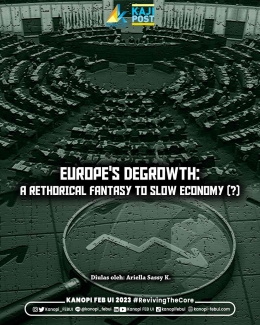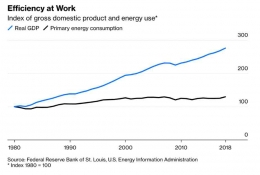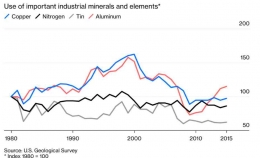Just in late May 2023, the European Parliament conducted the "Beyond Growth" conference. The EU The Beyond Growth 2023 Conference is a multi-stakeholder event aiming to discuss and co-create policies for sustainable prosperity in Europe. When it was first held in 2018, the idea of degrowth in Europe's policies faced a lot of backlashes, as stated by Philippe Lamberts, a Green MEP behind Beyond Growth. But what is interesting from the outcome of this, is that Europe's parliament has a strong preference towards degrowth in the economy. The trajectory of the concept from facing many backlashes for the "controversial" nature of going against the status quo in measuring the economy, to being a considerable option to put in Europe's economic policies is a topic worth dissecting.
On the origin of Degrowth
Degrowth was used for the first time within the context of production growth by the French Intellectual Andr Gorz in 1972. 'Dcroissance' (French for degrowth) in his context was to answer a question that's still the center of the debate itself:
'Is the earth's balance, for which no growth -- or even degrowth - of material production is a necessary condition, compatible with the survival of the capitalist system?'.
The spectrum on which degrowth can be defined varies. There's a point where it only ends in criticizing the use of GDP as the main measure of a society's success, the "post-growth" advocates beliefs in equal satisfaction regardless of economic fluctuations--moving away from constantly increasing output, and the de-growers, who constitute the majority at the conference, actively seek to intentionally reduce the size of the economic pie. They argue that growth harms the planet and primarily benefits the wealthy.
To measure the overall state of the economy, Gross domestic product (GDP) has evolved since the 20th century as the single most important economic indicator was institutionalized in the United Nations (UN) System of National Accounts in the post-war 1950s, enabling cross-country comparisons. As the industrial revolution started to maneuver the huge increase in production, it was indicated that the rising living standards, and life expectancy in the 20th century is also due to the significant periods of economic growth ever since.
But GDP as a measurement for the overall economy is often criticized as it doesn't consider where the increased production comes from (i.e. responding to wars or natural disasters) and how it ignores wealth distribution and the depletion of environmental common goods. While it does not always necessarily mean negative GDP growth, GDP reduction as currently counted for its early adaption, is one of the early steps to be promoted within its concept.
One of the more prominent suggestions goes as far as to say that wealthy economies should abandon GDP growth as a goal in the first place, and scale down destructive and unnecessary forms of production in order to reduce the use of energy and materials. The idea to change the objective of economic activity to securing human well-being has come to the attention which can enable rapid decarbonization and stop ecological breakdown while also improving social outcomes. With the end of the oil crisis and the rise of neoliberal economic policies in the 1980s through the 1990s, the interest to limit growth and degrowth-- grew.
In Policies and Rhetorics
One of the reasons degrowth is also still in opt is because of the low altitude level of decoupling expectation. Decoupling, which broadly means the divergence between carbon emissions and economic growth, is being considered in a somewhat pessimistic view where the European Parliamentary Research Service, Beyond Growth's document stated that absolute decoupling of global resource use and greenhouse gas (GHG) emissions from economic growth has not yet taken place and appears to be unlikely, if not outright impossible, to achieve in the future. Going as far as to consider that "sustainable growth" might be an oxymoron.
With all being said, most economists do not consider the said suggestion, as there can be said that a sustainable economy can grow because technical progress continues-- as what has been said by Sir Dieter Helm, professor of economic policy at the University of Oxford in his lectures. One of which is the efficiency of how we use energy is independent of the growth of GDP. One example can be seen in the U.S., where the gross domestic product (GDP) has continued to rise, even though energy use has stayed constant:
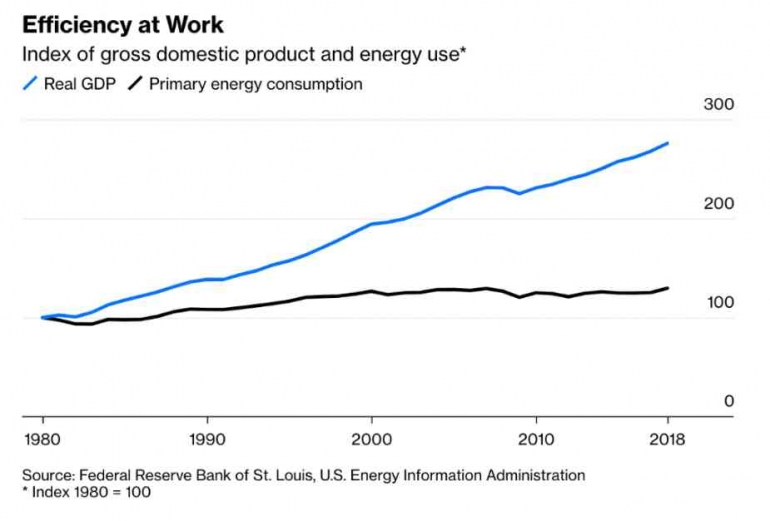
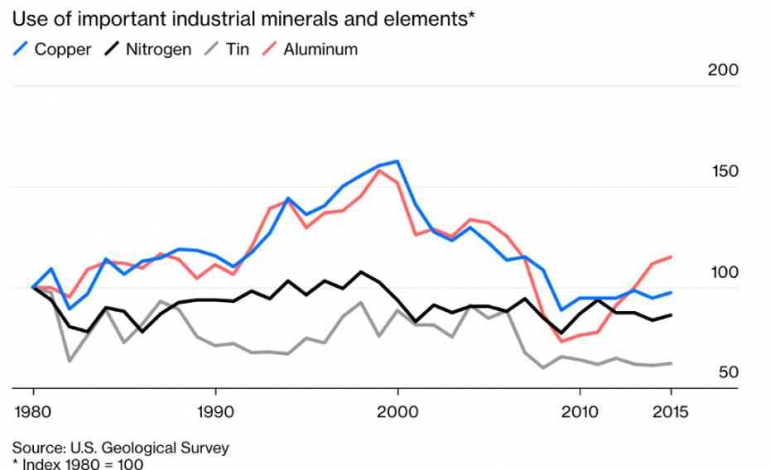
The statement on how economic growth requires intensive resource usage and huge emissions is, by far, an old belief in the early days of industrialization. Economic growth is supported by both extensive and intensive factors. We can see that when an economy expands extensively, it can grow in a straightforward way. However, intensive growth is different because it involves finding ways to improve productivity and efficiency through technological progress. Intensive growth means doing more with less, and it usually requires investing more money in things like new processes, and equipment, and improving product quality. It depends on a particular period when either extensive or intensive sources predominate. In the European Socialist countries up to about the mid-1960s, the extensive component of economic growth was not only dominant but in fact on the whole relatively increasing. The economic reforms, particularly those since the early 1960s, have mostly been designed to command these economies toward more intensive growth.
In recent years Europe, particularly, the concerns also came from Russia's war in Ukraine, and the energy crisis that its weaponization of gas supplies produced. In less than a year, large EU countries had reduced their natural gas consumption by more than 20 percent compared with the five-year average, without a corresponding increase in oil and coal use. Their overall industrial production, nevertheless, held up strongly.
If there's anything to be discovered at this conference by the EU parliament, it's how they're trying to solve it first. In the research literature done by Fitzpatrick in 2022 regarding degrowth policies proposal, it has been found that most proposals focus more on what a policy is supposed to achieve (objectives) rather than giving instruments in how a supposed policy can achieve it, often ignoring a diversity of transitional changes. The paper also found that most of these policies are studied in isolation, with few integrations between the elements within the degrowth agenda. And finally, the EU parliament held the conference as global resource use is currently on an unsustainable route, and with growing climate change concerns, it is an open quest for everybody to solve together.
Diulas oleh: Ariella Sassy Kirana | Ilmu Ekonomi 2021| Manager Divisi Kajian Kanopi FEB UI 2023/2024
References
Kallis, Giorgos & Demaria, Federico & D'Alisa, Giacomo. (2015). Introduction to "Degrowth: A Vocabulary for a New Era" (2015) PDF. Degrowth: A Vocabulary for a New Era. 1-17.
Jensen, Liselotte, et al. "Beyond Growth, Pathways towards Sustainable Prosperity in the EU." Https://Www.Europarl.Europa.Eu/Portal/En, European Parliamentary Research Service, 2023, https://www.europarl.europa.eu/RegData/etudes/STUD/2023/747108/EPRS_STU(2023)747108_EN.pdf.
Fitzpatrick, Nick, et al. "Exploring Degrowth Policy Proposals: A Systematic Mapping with Thematic Synthesis." Journal of Cleaner Production, Elsevier BV, Sept. 2022, p. 132764. Crossref, doi:10.1016/j.jclepro.2022.132764.
Sandbu, Martin. "'Degrowth' Starts to Move in from Europe's Policy Fringes | Financial Times." Financial Times, Financial Times, 30 May 2023, https://www.ft.com/content/e2f96618-081f-41de-b7a0-a682017c8d11.
Smith, Noah. "Economic Growth Shouldn't Be a Death Sentence for Earth." Bloomberg , 23 Oct. 2019, https://www.bloomberg.com/opinion/articles/2019-10-23/economic-growth-shouldn-t-be-a-death-sentence-for-earth?sref=R8NfLgwS.
The Economist. "Meet the Lefty Europeans Who Want to Shrink the Economy." The Economist, The Economist, 18 May 2023, https://www.economist.com/europe/2023/05/18/meet-the-lefty-europeans-who-want-to-shrink-the-economy.
Wilczynski, J. "Extensive and Intensive Growth." Socialist Economic Development and Reforms, Palgrave Macmillan UK, 1972, pp. 25--46, http://dx.doi.org/10.1007/978-1-349-01255-8_2.
Baca konten-konten menarik Kompasiana langsung dari smartphone kamu. Follow channel WhatsApp Kompasiana sekarang di sini: https://whatsapp.com/channel/0029VaYjYaL4Spk7WflFYJ2H






